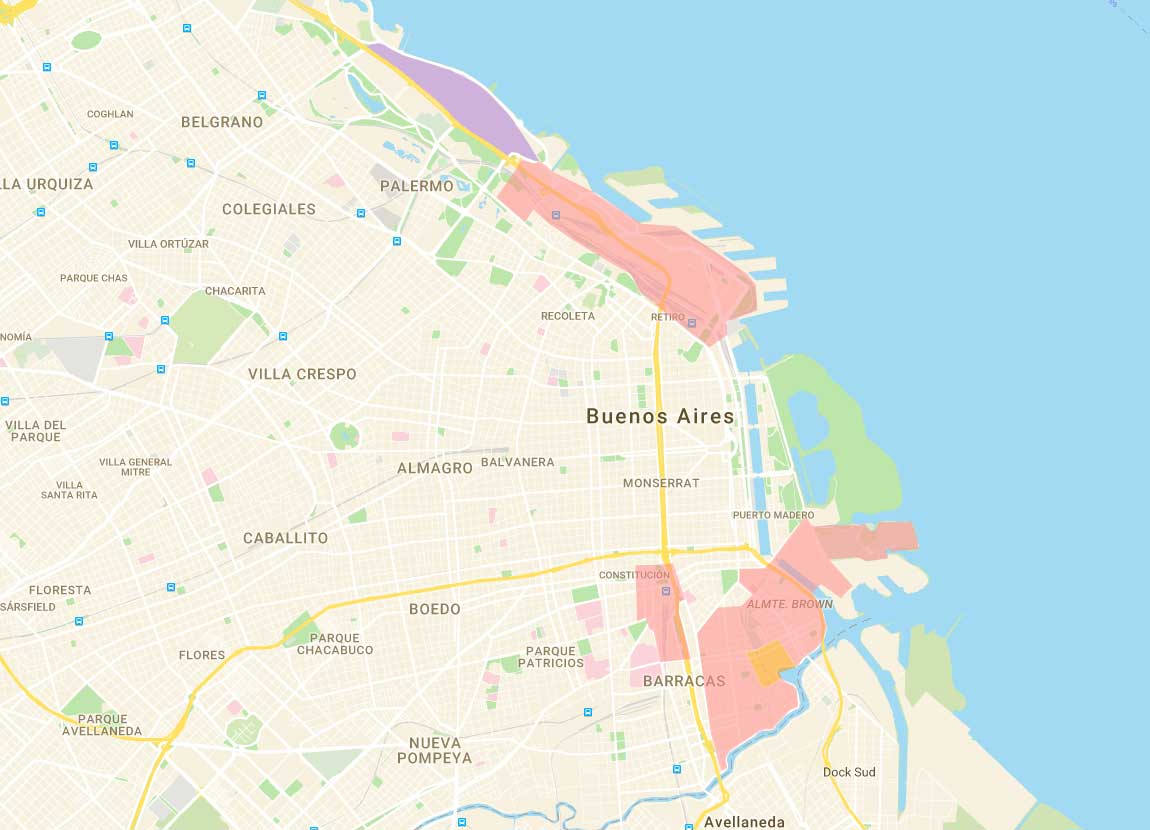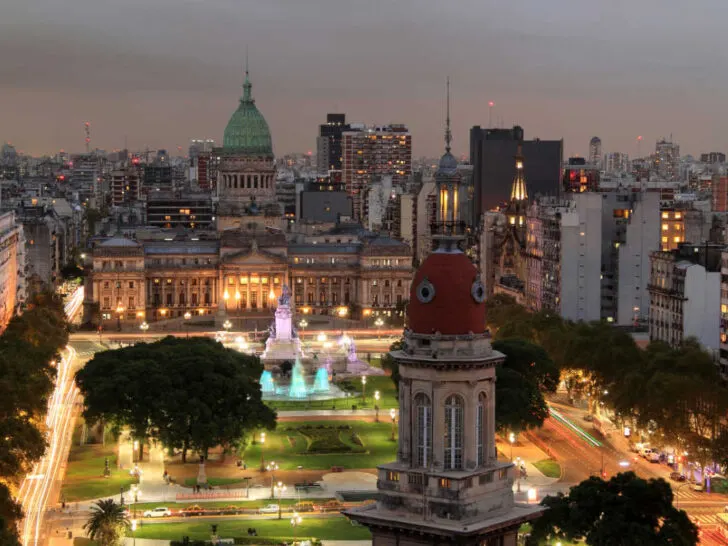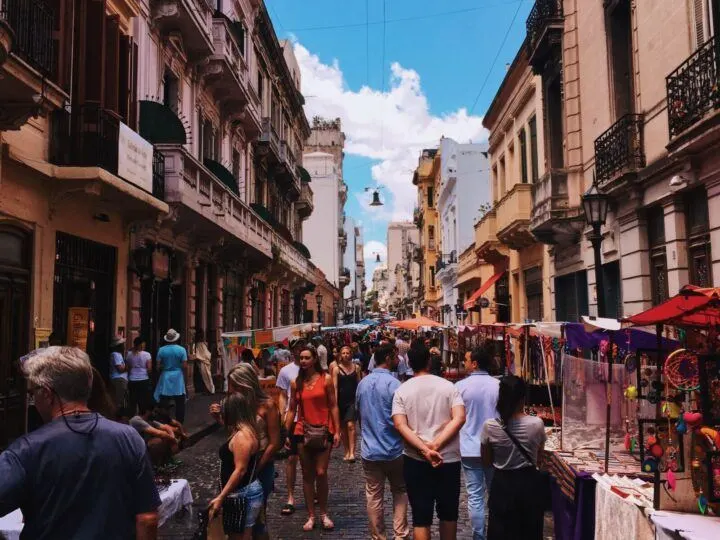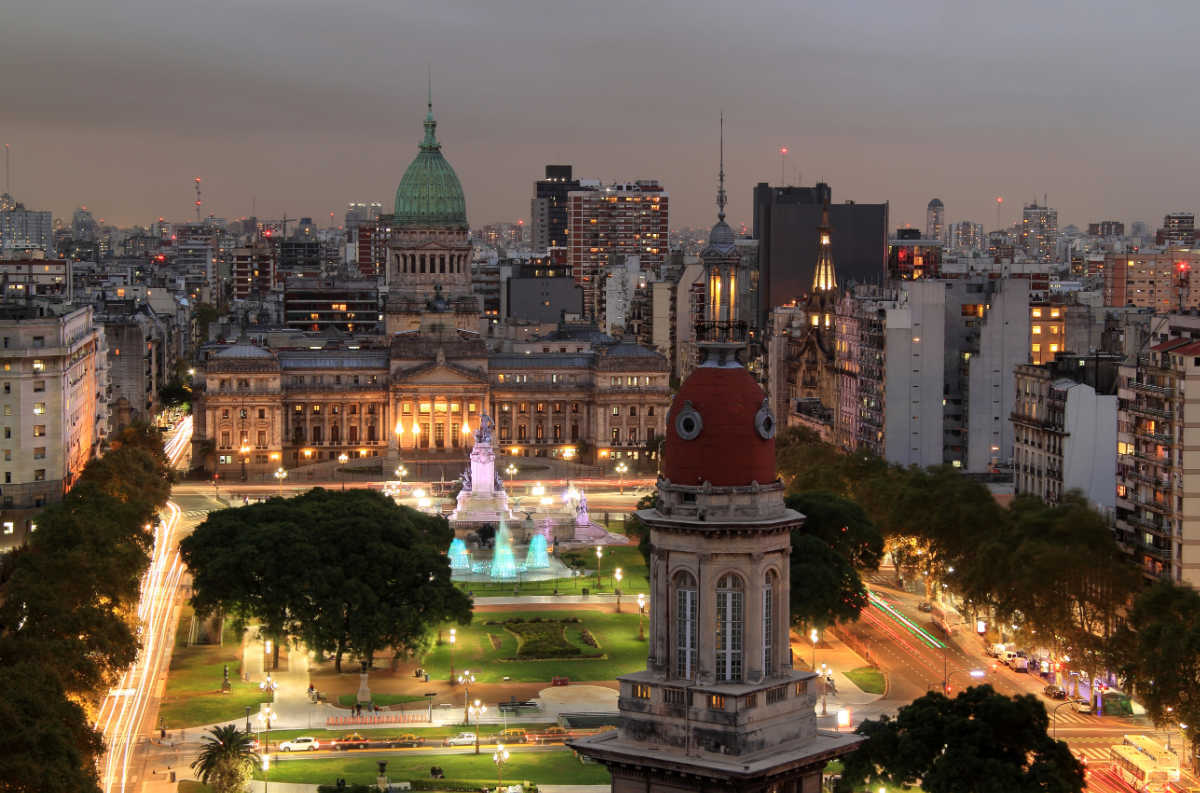Is it safe to walk around Buenos Aires at night
As the sun dips below the horizon, casting a warm glow over the vibrant metropolis of Buenos Aires, questions arise about the safety of navigating its streets after dark. While the city is known for its captivating charm by day, concerns linger about whether its allure extends to the nocturnal hours. Whether you're a seasoned traveler, a curious tourist, or a local seeking a glimpse of Buenos Aires' nightlife, understanding the safety precautions necessary for evening exploration is paramount. Let's delve into the realities of nighttime safety in Buenos Aires, exploring the areas to be aware of, the measures to take, and ultimately, whether it's safe to walk around Buenos Aires at night.
Is Buenos Aires Safe to Explore at Night? A Detailed Look
The safety of walking around Buenos Aires at night is a complex issue, not easily answered with a simple yes or no. It depends heavily on several factors, including the specific neighborhood, the time of night, and your own awareness and precautions. While Buenos Aires generally isn't considered a wildly dangerous city, like some others in South America, certain areas are riskier than others, particularly after dark. Tourist areas are generally safer, but even there, petty theft remains a concern. Being aware of your surroundings and taking basic safety precautions is crucial for a safe and enjoyable nighttime experience.
Neighborhood Variations in Safety
Buenos Aires is a large city with a diverse range of neighborhoods, each with its own unique character and safety profile. Areas like Palermo Soho and Recoleta are generally considered safe, even at night, thanks to their high concentration of restaurants, bars, and hotels, keeping them well-lit and populated. However, venturing into less-touristy areas, particularly in the outskirts, after dark can be riskier. Research your destination thoroughly before heading out and be mindful of areas known for higher crime rates. Stick to well-lit and populated streets whenever possible.
Petty Theft: A Common Concern
Petty theft, such as pickpocketing and bag snatching, is the most common crime tourists encounter in Buenos Aires, day or night. Be vigilant about your belongings at all times. Avoid displaying expensive jewelry or electronics openly. Keep your valuables close to your body and be aware of your surroundings, especially in crowded areas. Carrying only essential items and using secure bags can significantly reduce your risk.
Transportation at Night: Safe Options
While walking is a great way to explore the city, using reliable transportation at night can enhance safety. Taxis and ride-sharing services like Uber are readily available and generally safe. Always ensure the car is properly licensed and use the official apps for ride-sharing services to track your ride and payment. Avoid walking alone in poorly lit or deserted areas, particularly late at night. Public transportation is generally safe during peak hours, but using it at night might be less advisable in some areas.
Personal Safety Measures: Best Practices
Regardless of the neighborhood, taking personal safety measures is essential. Avoid walking alone at night, especially in less populated areas. Let someone know your plans and whereabouts. Trust your instincts; if a situation feels unsafe, remove yourself from it immediately. Learn some basic Spanish phrases to help you communicate if needed. Stay aware of your surroundings, avoid distractions like your phone, and be confident in your demeanor.
Emergency Contacts and Resources
Knowing who to contact in case of an emergency is vital. Make a note of emergency numbers (police, ambulance) before your trip. You might also want to research local tourist information centers which can often provide assistance and safety information. Familiarize yourself with the location of nearby police stations, particularly if you're staying in a less central area. Having a reliable way to contact others is always recommended.
| Factor | Safety Considerations |
|---|---|
| Neighborhood | Stick to well-lit and populated areas, especially at night. Research areas before venturing out. |
| Time of Day | Avoid walking alone late at night, particularly in less touristy areas. |
| Personal Belongings | Keep valuables close to your body and avoid displaying expensive items. |
| Transportation | Use reputable taxis or ride-sharing services at night. |
| Awareness | Stay vigilant, trust your instincts, and be aware of your surroundings. |
Where not to walk in Buenos Aires?

Where Not to Walk in Buenos Aires?
Buenos Aires, like any large city, has areas best avoided, particularly at night or if you're alone. While generally safe, certain neighborhoods experience higher rates of petty crime, such as pickpocketing and bag snatching. The level of risk can also vary depending on the time of day and your awareness of your surroundings. It's crucial to be vigilant and avoid displaying expensive jewelry or electronics openly. Trust your instincts; if an area feels unsafe, it's best to leave.
Areas to Avoid at Night
Many areas that are vibrant and bustling during the day can become less safe at night. Reduced visibility and fewer people on the streets increase the opportunity for crime. It's advisable to stick to well-lit, main streets and avoid venturing into poorly lit alleys or side streets, especially if you're alone. Consider using ride-sharing services or taxis for nighttime travel in areas you're unfamiliar with. Always be aware of your surroundings and avoid distractions like your phone.
- Avoid poorly lit areas: Darkness provides cover for criminals.
- Stick to well-trafficked streets: More people mean more witnesses and less opportunity for crime.
- Use ride-sharing services or taxis: This is a safe and convenient option at night.
Certain Neighborhoods with Higher Crime Rates
While generalizations are dangerous, some neighborhoods have a statistically higher incidence of crime. Research specific areas before visiting, particularly if you plan on venturing out at night or into less touristy zones. Local advice and up-to-date safety information are invaluable. Utilizing online forums and travel advisories can provide insights into current situations and potential risks. Remember that even within these neighborhoods, safety can vary greatly from block to block.
- Research specific neighborhoods beforehand: Utilize online resources to stay informed.
- Avoid isolated areas: These are prime targets for criminals.
- Be aware of your surroundings at all times: Situational awareness is key to personal safety.
Areas with a High Concentration of Pickpockets
Tourist hotspots, crowded areas, and public transportation are common targets for pickpockets. Keeping valuables close and being mindful of your belongings is essential. Avoid displaying expensive jewelry or electronics, and be extra cautious in crowded situations. Consider using a money belt or other discreet methods to secure your valuables. Remember, pickpockets often work in teams, distracting you while another steals your belongings.
- Be vigilant in crowded areas: Pickpockets thrive in crowds.
- Keep valuables close and secure: Use a money belt or other discreet methods.
- Avoid distractions: Pay attention to your surroundings.
Walking Alone at Night
Walking alone at night, especially in less populated areas, significantly increases your vulnerability to crime. It's strongly recommended to avoid this if possible. If you must walk alone at night, stick to well-lit main streets, and consider letting someone know your route and expected arrival time. Carrying a personal safety device like a whistle or pepper spray can offer a degree of protection, but prevention is always the best approach.
- Avoid walking alone at night if possible: This significantly increases risk.
- If you must walk alone, stick to well-lit and populated streets: Increase your visibility and deter criminals.
- Inform someone of your route and estimated time of arrival: This ensures someone knows your whereabouts.
Trust Your Instincts
Perhaps the most important advice is to trust your instincts. If a place or situation feels unsafe, leave immediately. Your intuition is a powerful tool, and it's always better to err on the side of caution. Don't hesitate to seek assistance from local authorities or trusted individuals if you feel threatened or unsure about your surroundings. Your safety is paramount.
- Trust your intuition: If something feels unsafe, leave immediately.
- Seek assistance if necessary: Don't hesitate to ask for help from local authorities or trusted individuals.
- Prioritize your safety: Your well-being is paramount.
Is Buenos Aires safe for American tourists?

Whether Buenos Aires is safe for American tourists is a complex question with no simple yes or no answer. Safety in Buenos Aires, like any major city, depends heavily on the specific location, time of day, and the tourist's own precautions. While serious crime exists, it's often not randomly targeted at tourists. However, petty theft, particularly pickpocketing and bag snatching, is more prevalent. American tourists should be aware of their surroundings and take sensible precautions to minimize their risk. The perception of safety can also vary greatly depending on individual experiences and the neighborhoods visited.
Areas to Avoid at Night
Certain areas of Buenos Aires, especially at night, pose a higher risk of crime. These are generally areas with high poverty levels and less visible police presence. It's advisable to avoid wandering alone in these neighborhoods after dark. Researching the safest neighborhoods before your trip is highly recommended, as well as using reliable transportation services at night. Staying in well-lit and populated areas is always a safer bet.
- Avoid walking alone at night in less populated areas.
- Use reputable taxi or ride-sharing services instead of walking long distances at night.
- Stick to well-lit and busy streets, particularly in less familiar areas.
Petty Theft and Pickpocketing
Petty theft, including pickpocketing and bag snatching, is a common problem in Buenos Aires, targeting both locals and tourists. These crimes often occur in crowded areas like markets, public transportation, and tourist attractions. Tourists should be vigilant about their belongings at all times, keeping valuables close and avoiding displaying expensive jewelry or electronics. Being aware of one's surroundings and avoiding distractions can significantly reduce the risk.
- Keep valuables secure in inner pockets or hidden bags.
- Be mindful of your surroundings and avoid distractions while walking in crowded areas.
- Use cross-body bags and keep a firm grip on purses and bags.
Transportation Safety
While taxis and ride-sharing services are generally safe, it's crucial to be cautious. Using reputable apps and established taxi companies is recommended. Never get into an unmarked taxi or accept rides from strangers. When using public transportation, be aware of your surroundings and keep a close watch on your belongings. Avoid travelling alone late at night, particularly on less frequented routes.
- Use reputable ride-sharing apps or registered taxi services.
- Verify the taxi's license and driver information before entering.
- Share your ride details with someone you trust.
Scams Targeting Tourists
Like many tourist destinations, Buenos Aires has its share of scams targeting unsuspecting visitors. These can range from inflated prices in tourist traps to more elaborate schemes. Being aware of common scams and practicing caution can help you avoid becoming a victim. Researching common scams beforehand and exercising a healthy skepticism can help to protect yourself from financial loss.
- Be wary of overly friendly strangers offering unsolicited help or services.
- Negotiate prices before agreeing to any services or purchases.
- Avoid exchanging money on the street or from unofficial sources.
Emergency Assistance
Knowing how to access emergency services is vital for any traveler. It's useful to save emergency contact numbers in your phone, including local police and medical services. Familiarizing yourself with the procedures for reporting crimes or seeking medical attention will help in case of an emergency. Consider informing someone of your itinerary and checking in regularly with family or friends back home.
- Save emergency contact numbers for police and medical services.
- Inform someone of your itinerary and planned activities.
- Check in with friends or family regularly to provide updates.
Is it safe to walk around Buenos Aires alone?

Whether it's safe to walk around Buenos Aires alone depends heavily on several factors, including the time of day, the neighborhood, and your own awareness and precautions. While Buenos Aires is generally a vibrant and relatively safe city, like any major metropolis, it has areas that are safer than others. Petty theft, such as pickpocketing, is a more common concern than violent crime. However, violent crime does exist, albeit at a lower rate than in many other comparable cities. Being aware of your surroundings, avoiding poorly lit areas at night, and keeping valuables secure are crucial to minimizing risk. The perception of safety can also be subjective, with some individuals feeling more comfortable than others in certain situations. Ultimately, the level of personal risk is influenced by a combination of circumstances and individual choices.
Time of Day and Location
The safety of walking alone in Buenos Aires is significantly impacted by the time of day and the specific location. During the daytime, particularly in well-populated and touristy areas, the risk is considerably lower. However, as evening approaches and the streets become less crowded, the potential for petty crime increases. It's advisable to avoid walking alone in less populated areas, particularly at night. Certain neighborhoods are known to be safer than others, and research beforehand is highly recommended. Always stick to well-lit and busy streets.
- Daytime is generally safer than nighttime for solo walking.
- Avoid poorly lit streets and isolated areas, especially at night.
- Research safe neighborhoods and stick to those areas when possible.
Common Types of Crime
While violent crime is not prevalent in Buenos Aires, petty theft, such as pickpocketing and bag snatching, is a more common concern. Tourists are often targeted, so vigilance is essential. Be aware of your surroundings, avoid displaying expensive jewelry or electronics openly, and keep your valuables secure in zipped pockets or bags. These precautions can greatly reduce the risk of becoming a victim. Other common forms of crime include scams and tourist traps. Researching common scams before your trip can help you avoid falling prey to them.
- Pickpocketing is a significant concern, particularly in crowded areas.
- Be aware of scams and tourist traps targeting unsuspecting tourists.
- Keep valuables secure and out of sight to deter thieves.
Personal Safety Measures
Taking proactive steps to ensure your personal safety is crucial when walking alone in Buenos Aires. This includes being aware of your surroundings, avoiding distractions like your phone, and trusting your instincts. If a situation feels unsafe, it's best to remove yourself from it. Learning some basic Spanish phrases can also be helpful in navigating situations and asking for assistance if needed. Consider carrying a whistle or personal safety alarm as a deterrent.
- Maintain situational awareness and avoid distractions.
- Trust your instincts and remove yourself from potentially unsafe situations.
- Learn basic Spanish phrases to aid in communication.
Neighborhoods to Avoid (or Exercise Caution In)
Some neighborhoods in Buenos Aires have higher crime rates than others. While it's not advisable to generalize about entire areas, researching specific neighborhoods before venturing out at night is always recommended. Many guidebooks and online forums offer insights into safer and less safe areas. If you are unsure about a neighborhood, it's always best to err on the side of caution and either avoid it entirely or explore it during the daytime in well-populated areas.
- Research specific neighborhoods before visiting, especially at night.
- Avoid poorly lit and sparsely populated areas at all times.
- Use reputable transportation options, especially at night.
Transportation Options
Using reliable transportation options can significantly enhance safety, particularly at night or in less familiar areas. Buenos Aires has a good public transportation system, including subways and buses, which are generally safe during peak hours. Ride-hailing apps are also readily available. However, it's always advisable to use reputable services and share your location with someone you trust. Avoid hitchhiking or accepting rides from strangers.
- Utilize reliable public transportation, especially during peak hours.
- Use reputable ride-hailing apps and share your location.
- Avoid informal transportation options or accepting rides from strangers.
Is it safe to walk around Buenos Aires with a camera?

Generally, walking around Buenos Aires with a camera is safe, but like any major city, it requires awareness and precautions. Petty theft is the primary concern, particularly in crowded areas or at night. While violent crime against tourists is relatively uncommon, it's crucial to remain vigilant and avoid displaying expensive equipment ostentatiously. The level of safety can also vary depending on the specific neighborhood; some areas are safer than others. A good rule of thumb is to exercise the same caution you would in any unfamiliar urban environment.
Tourist Areas and Safety
Popular tourist destinations in Buenos Aires are generally well-patrolled and relatively safe. However, even in these areas, it's advisable to keep your camera secure, using a neck strap or shoulder bag and avoiding distracting displays of wealth. Pickpocketing remains a risk, especially during peak tourist seasons or in crowded areas. Remember to be mindful of your surroundings and keep valuables close.
- Stick to well-lit and populated streets, especially at night.
- Avoid displaying expensive camera equipment openly, like leaving it visibly attached to your bag.
- Be aware of your surroundings and avoid looking distracted or engrossed in your camera while walking.
Neighborhood Variations in Safety
Buenos Aires has a diverse range of neighborhoods, each with its own character and safety profile. While some areas are generally considered safer than others, it's always wise to research the specific area you're visiting beforehand. Certain neighborhoods, particularly at night, might have higher rates of petty crime. Use your judgement and trust your instincts; if an area feels unsafe, it's best to avoid it.
- Research the neighborhood before venturing into it, using online resources and travel guides.
- Consider using a reputable taxi or ride-sharing service rather than walking alone at night in less safe areas.
- Avoid walking alone in isolated or poorly lit areas, regardless of the time of day.
Best Practices for Camera Safety
Regardless of the location, taking some simple precautions can significantly reduce the risk of theft or damage to your camera. Using a discreet camera bag and avoiding ostentatious displays of expensive equipment are key. Keeping your camera secure and close to your body at all times can prevent opportunistic theft. It's also wise to insure your camera and other valuables before your trip.
- Use a discreet camera bag or case that doesn't immediately scream "expensive camera".
- Utilize a neck strap or shoulder strap to keep your camera close and prevent accidental drops or snatchings.
- Consider purchasing travel insurance that covers loss or damage to your camera.
Dealing with Potential Theft
While unlikely, if you do become a victim of theft, remain calm and do not resist. Your safety is paramount. Report the crime to the local authorities as soon as possible. Keep detailed records of your camera's make, model, and serial number, along with any photos or videos you had stored on it, in case you need to make an insurance claim.
- Prioritize your safety and avoid any confrontation.
- Report the theft to the police and obtain a police report.
- Contact your insurance company to initiate a claim if you have travel insurance.
Photography Etiquette in Buenos Aires
While photography is generally welcomed in Buenos Aires, it's crucial to be respectful. Always ask for permission before photographing individuals, especially in private residences or sensitive locations. Be mindful of cultural sensitivities, and avoid intrusive or exploitative photography. A respectful approach will ensure a positive experience for both you and the locals.
- Always ask for permission before taking photos of people.
- Be mindful of cultural norms and avoid photographing in areas where it might be considered inappropriate.
- Respect people's privacy and avoid taking photos of sensitive or private information.
Is it safe to walk alone at night in Buenos Aires?
Safety in Buenos Aires at night, like any large city, is relative and depends on several factors. While generally not unsafe, exercising caution is always recommended. Walking alone at night in less populated or poorly lit areas increases your risk. Tourist areas generally experience more police presence and foot traffic, making them relatively safer. However, even in popular areas, petty theft, such as pickpocketing, can still occur. It's crucial to be aware of your surroundings, avoiding distractions like your phone, and sticking to well-lit, main streets. Women should be especially vigilant and consider using a taxi or ride-sharing service late at night, particularly in less familiar neighborhoods. Carrying only necessary cash and avoiding displaying expensive jewelry or electronics significantly minimizes your risk. Trusting your instincts is key; if a situation feels unsafe, remove yourself from it immediately. Ultimately, the level of safety is dependent on your situational awareness and preparedness.
Are there specific areas to avoid at night in Buenos Aires?
While most of Buenos Aires is relatively safe, certain areas should be approached with increased caution at night. Specific neighborhoods with higher crime rates can vary, and it's advisable to check recent travel advisories and local news for updated information. Generally, areas far from the city center, particularly those with limited lighting and less foot traffic, pose a greater risk. Similarly, avoid walking alone in poorly maintained or isolated areas. Researching your destination before you go and using reliable maps to plan your routes is essential. Even within generally safe areas, remaining aware of your surroundings and avoiding dark alleys or unpopulated streets is vital. Remember, perception of safety also plays a role; even if an area isn't statistically dangerous, if it feels unsafe to you, it's best to avoid it.
What precautions should I take if I walk at night in Buenos Aires?
Taking proactive measures can significantly improve your safety when walking in Buenos Aires at night. Firstly, stick to well-lit and populated streets. Avoid walking alone if possible; travel with a friend or family member. If you must walk alone, let someone know your itinerary and expected time of return. Keep your phone charged and readily accessible, but avoid using it excessively in public to avoid drawing unwanted attention. Be mindful of your belongings, keeping valuables close to your body and out of sight. Avoid displaying expensive jewelry or electronics. Be aware of your surroundings; don't appear distracted or lost, and avoid making eye contact with people who seem suspicious. If you feel unsafe, cross the street or head towards a more populated area. Learning a few basic Spanish phrases can also be helpful in case you need to ask for assistance. Finally, consider using a taxi or ride-sharing service, especially late at night or in unfamiliar areas.
Is it safer to use taxis or ride-sharing services at night in Buenos Aires?
Using a reputable taxi or ride-sharing service is generally considered safer than walking alone at night in Buenos Aires, especially in less familiar areas. However, even with these services, some precautions are necessary. When using taxis, try to use official taxi ranks or apps, and always note the taxi's license plate number. For ride-sharing services, verify the driver's information matches the app and share your trip details with a friend or family member. Never get into a vehicle that doesn't seem safe or with a driver who seems suspicious. Trust your instincts; if anything feels off, cancel the ride and find alternative transportation. Remember to check reviews and ratings of the service before booking and be aware of potential scams or inflated fares. While using these services significantly reduces the risk, remaining vigilant is always essential for maintaining your safety.
Deja una respuesta